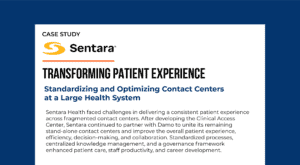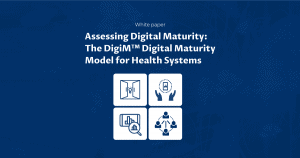Unlocking AI’s Potential in Healthcare: The Journey Towards Digital Transformation

“We need to increase our capacity as health systems to ingest the right AI solutions, digest them, and maximize their value.”
– Dr. Ashish Atreja, Founder VALID AI and Venture Partner, GlobalVenturesX
Listen to the full conversation
The Evolution of Digital Health and AI
Ashish’s journey into AI and digital health began over two decades ago when he encountered a lung transplant case during his residency at Cleveland Clinic. He realized that traditional medical knowledge, often outdated by the time it reached textbooks, could be enhanced through technology. That spark led him to specialize in informatics, supporting digital health implementations at Mount Sinai and later leading transformation efforts at UC Davis Health.
His career has been dedicated to leveraging technology to enhance medical practice and patient outcomes. This led him to the founding of VALID AI – a collaborative network of over 50 organizations focused on streamlining AI evaluation, governance, and adoption in healthcare. By fostering collaboration, Valid AI prevents duplication of efforts across health systems, enabling shared learning and accelerating the safe deployment of AI solutions.
“Technology as an enabler has the potential to touch the masses if we do things right.”
– Dr. Ashish Atreja, Founder VALID AI and Venture Partner, GlobalVenturesX
AI’s Role in Solving Healthcare’s Biggest Challenges
As AI adoption scales, identifying high-impact use cases is critical. According to Ashish, the three primary domains where AI is making a difference:
Physician and Employee Productivity: AI-powered tools, including AI scribes, are reducing physician burnout by automating documentation while also expanding support to all healthcare employees, not just clinicians.
Patient Automation and Access: Generative AI solutions, including AI-driven chatbots and virtual assistants, are automating patient interactions, improving healthcare access, and reducing administrative burdens.
Operational Efficiency: AI is enhancing revenue cycle management (RCM) and medical coding accuracy while automating routine tasks to reduce inefficiencies and optimize resource allocation.
However, AI integration must be strategic. “It’s not about bringing AI into healthcare; it’s about solving the right problems,” Ashish explains. Health systems need to prioritize AI implementations that align with their strategic goals, ensuring maximum impact.
Governance and the AI Adoption Framework
For AI to succeed, health systems must establish a structured adoption process. At UC Davis Health, Ashish and his team follow a strategy-first approach, ensuring AI initiatives support broader organizational objectives. This process involves:
- Strategic alignment: Identifying how AI fits into the organization’s vision.
- Governance structures: Engaging cybersecurity, ethics, compliance, and procurement teams.
- Prioritization: Selecting the most impactful AI use cases rather than attempting to adopt all available solutions.
- Implementation and monitoring: Ensuring AI solutions are integrated effectively and continuously evaluated for performance.
Dr. Atreja suggest that health systems must build internal capacity before taking on AI solutions to ensure they extract real value from them.
Unlocking the Productivity Paradox with AI
AI in healthcare is often met with skepticism due to past technological implementations that failed to deliver promised efficiencies. Dr. Atreja believes AI can resolve healthcare’s long-standing productivity paradox and help scale care delivery beyond traditional limits, reaching millions of patients effectively through technology-driven innovation.
He explores key AI use cases and also stresses on the need for a strategy-first approach, governance frameworks, and continuous monitoring to ensure AI delivers tangible value to healthcare systems. With proper governance, collaboration, and strategy-driven implementation, AI can enhance productivity, improve patient outcomes, and create long-term efficiencies.
Looking ahead, initiatives like Valid AI will play a crucial role in ensuring AI adoption is both scalable and sustainable. The focus is shifting toward implementation at scale, making AI solutions accessible and affordable for all healthcare organizations.
“I feel the time is here when we unlock the productivity paradox with AI technology for healthcare.”
The Startups and AI Innovation
Beyond enterprise-level AI adoption, Ashish also has deep experience working with startups in the digital health space. He describes building startups as similar to raising a child. Many AI-driven startups are emerging with innovative solutions, but their success depends on seamless integration with existing health systems and regulatory compliance.
“Startups are like raising a kid; you have to put your heart and soul into it.”
– Dr. Ashish Atreja, Founder VALID AI and Venture Partner, GlobalVenturesX
By fostering an ecosystem where health systems and startups collaborate, AI innovations can be deployed faster and more effectively, benefiting both providers and patients.
The Future of AI in Healthcare
As AI continues to evolve, healthcare organizations must take a measured and strategic approach to adoption. The path forward includes – strengthening AI governance frameworks, prioritizing impactful and feasible use cases, enhancing collaboration across health systems, and ensuring continuous monitoring and evaluation of AI solutions.
AI has the potential to transform healthcare at scale, but only if organizations take the right steps to harness its power. As Ashish aptly puts it, “Technology as an enabler has the potential to touch the masses if we do things right.”
With leaders like Ashish Atreja driving AI initiatives, the future of healthcare looks promising—one where AI not only augments human capabilities but also enhances patient care and operational efficiency on a massive scale.












